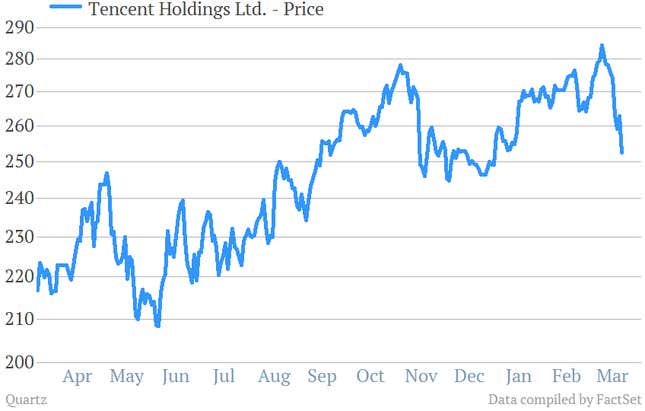Despite beating 2012 earnings expectations yesterday, shares for Tencent, China’s biggest tech company, fell in Hong Kong trading today, after analysts downgraded the stock. The reason? Shrinking margins and slowing growth in online games.

And just what is shrinking those margins? Tencent cited rising costs of its social networking app, WeChat. Given how popular it is in China already, most of those rising costs are probably from Tencent’s overseas push. And that’s why yesterday’s earnings and today’s share-price recoil signal choppy waters ahead for some of China’s internet giants.
At first glance, it might seem like those analysts were overreacting. After all, Tencent’s 2012 revenue rose 54%! And, it’s the biggest, most diversified tech company in China. Plus, it’s proven ruthless at ripping market share out of its competitors’ soft, feeble hands. And with their own products, to boot. In fact, the Tencent model eschews innovation entirely: See profitable internet product, copy it, blast it out over your ubiquitous social media platform, rinse, and repeat.
Not that copycatting is ipso facto objectionable. But since the launch of messaging platform QQ in 1998, Tencent hasn’t really done anything but copycat. In the last three or so years, we have Tencent Weibo, the spitting image of Sina Weibo (itself a copy of Twitter). A slew of mobile apps. And guess which lastest internet sensation claims WhatsApp and Viber as its sire and dam? The list goes on long enough that this knack for theft is as much Tencent’s signature as the penguin is.
While we’re on the topic, let’s discuss Baidu. China’s Google doppelganger now enjoys something like 80% market share (when Google China left the China market, Baidu had between 68% and 58% of the market). How did it win that? Sure, it had first-mover advantage, and its Chinese-language algorithm is thought to be excellent. Still, almost all of its products come straight off the pages of other companies (paywall). Tellingly, Robin Li, its founder and CEO, pooh-poohs “innovation for innovation’s sake”—though when he tried his hand at it once, he whiffed (paywall).
A fair rebuttal to this attack might be that Tencent and, to a lesser extent, Baidu, are good at tailoring existing products to the Chinese market—a form of innovation if you tilt your head just so. But that doesn’t really hold water. The Great Firewall and the Chinese government made sure that neither company had to compete against the foreign originals or their China-focused versions.
That means that Tencent’s and Baidu’s blockbuster products, knack for acquisition and the skills of their crackerjack development teams haven’t been rigorously market-tested. Even their China successes have, in effect, been subsidized by Chinese government protectionism.
That’s probably something investors should keep in mind as Tencent and Baidu gear up to compete globally.
And while both tech titans are already pushing into developed and emerging markets, those moves are but the beginning steps of a much longer march. If Tencent’s rising costs are anything to go by, it’s a journey that could get really expensive, really fast.